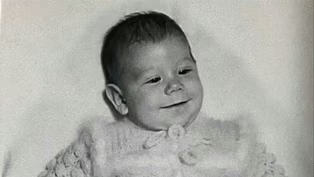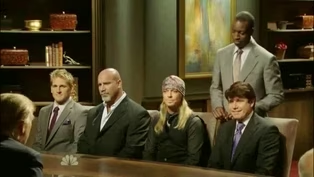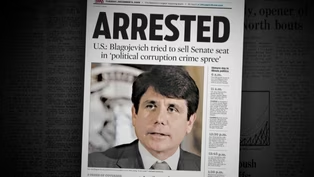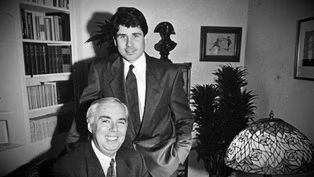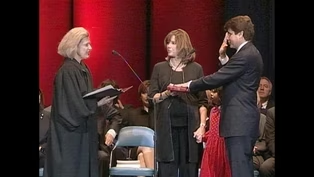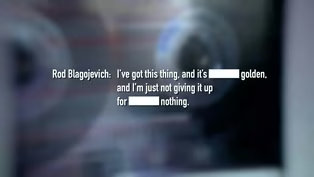Chicago Stories
Extended Interview: Blagojevich on His Time in Prison
Clip: 10/10/2025 | 12m 42sVideo has Closed Captions
Former Governor Rod Blagojevich examines his time in prison.
Former Governor Rod Blagojevich discusses his experience in a Colorado prison, his fellow inmates, and how he passed the time.
Problems playing video? | Closed Captioning Feedback
Problems playing video? | Closed Captioning Feedback
Chicago Stories is a local public television program presented by WTTW
Lead support for CHICAGO STORIES is provided by The Negaunee Foundation. Major support is provided by the Abra Prentice Foundation, Inc. and the TAWANI Foundation.
Chicago Stories
Extended Interview: Blagojevich on His Time in Prison
Clip: 10/10/2025 | 12m 42sVideo has Closed Captions
Former Governor Rod Blagojevich discusses his experience in a Colorado prison, his fellow inmates, and how he passed the time.
Problems playing video? | Closed Captioning Feedback
How to Watch Chicago Stories
Chicago Stories is available to stream on pbs.org and the free PBS App, available on iPhone, Apple TV, Android TV, Android smartphones, Amazon Fire TV, Amazon Fire Tablet, Roku, Samsung Smart TV, and Vizio.
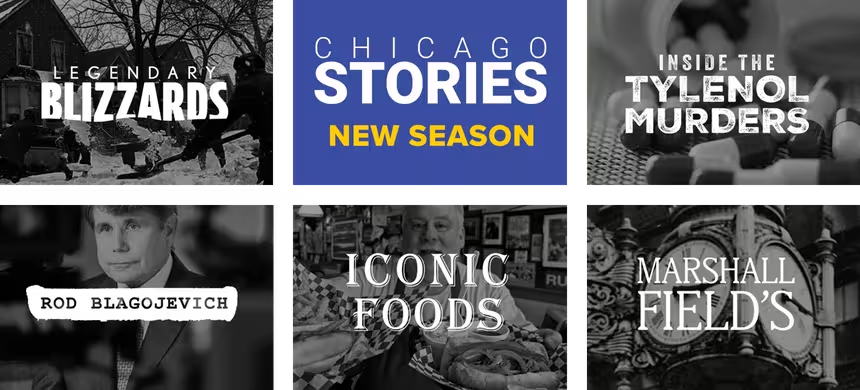
Chicago Stories - New Season!
Blizzards that brought Chicago to a standstill. A shocking unsolved murder case. A governor's fall from power. Iconic local foods. And the magic of Marshall Field's legendary holiday windows.Providing Support for PBS.org
Learn Moreabout PBS online sponsorship- Well, I mean, the moment I stepped into it, it's a stark change.
'Cause the moment you walk in, the correctional officers there and the high-ranking officials that were there to greet me, they didn't say, "Oh, welcome to Colorado.
You can enjoy yourself here."
They say, "Turn around," and put handcuffs on you.
And then you have to go through all kinds of indignities, including full-body cavity strip searches and medical evaluations and things like that.
And then you know that you just walked in, and, you know, you'd like to think that you can get fair treatment in the court, and a couple of years you'll get home because you're gonna win your appeal, 'cause you can't lose 'cause the law's 100% on your side.
And yet deep down you know it's rigged, man.
It's gonna be a long haul.
And then you walk in and you meet your new neighbors, and they just saw you on television, literally on live TV; they're watching you walk into prison.
I was a very unusual inmate 'cause they never saw this before.
And I should say that I was put in a higher-security prison no governor's been put into.
I traded a 50,000, I went from a 50,000-square-foot governor's mansion to a six-foot by eight-foot prison cell.
And I'm in a prison with Gangster Disciples and Crips and Bloods and Sinaloa cartel drug dealers who look up to El Chapo like my daughters look up to Taylor Swift.
There were murderers in there, 400 sex offenders, pedophiles, bank robbers, con men, 2% white collar, one governor, me: real prison like in the movies.
And they did that too.
I never took a penny.
Don't even say I did.
It was all talk.
They did that because they were squeezing me.
But I went in there and I had that long haul, and my heart was broken 'cause I just left home.
And, you know, how do you say goodbye to your little girls?
See you in 14 years, or 12 and a half years, whatever it might be.
It's a hard goodbye.
And they were little and so vulnerable and alone.
And I was worried about them and my wife.
And the media let everybody know where we lived so it wasn't like they could hide.
So I had great concern, great fear for them, great fear and concern for how they were feeling, especially my little girls, both of them.
Our little Annie was eight years old when I left.
And Amy, our older one, was 15.
And of course I know it's this long journey ahead of me.
And then I meet my new neighbors.
And I see my new housing unit, and I describe it in the book that I'm writing, it was all stark white.
And, you know, they lock you in and the gates close.
They're big iron gates, and you could hear the thud every time they lock you in.
And you get prison clothes.
And I was a matter of great curiosity to my new neighbors because they just saw me on TV.
But it was heartwarming because almost all of them were like extremely nice.
And I'm talking tough, tough gangbanger-type guys.
And they welcomed me with a welcome basket that they had scraped together from their meager means to go to the commissary in advance of me coming the week before they went.
And there was a toothbrush in there and toothpaste.
There were shower shoes, because there's all kinds of infections you get from the common areas that are used: 900 guys, you know, in the units.
There's 90 guys in each area, unless you're lucky to get a a cell, which I eventually got, but none of that's any good, right?
But it was really heartwarming, and there was a drug dealer by the name of Hawaii who presented me the bag with a bunch of these other guys.
And they were sheepish around me, like I was still the governor.
They didn't quite know how to talk to me.
And they just said, "Governor," very respectful, "we just thought we'd like to welcome you to our world.
And these things could be helpful to you as you get used to this place."
And, you know, it was multiracial and multiethnic.
And these guys, they had the look of, you know, tough-guy criminals.
They had, you know, shaved heads, tattoos all over, tatted up all over.
You know, some guys had ringlets in their beards and stuff.
You know, one guy in particular looked a lot like he'd have been a, you know, warrior from Genghis Khan's legions back in the heyday of the Mongol invasions.
There was a guy that refused to shake my hand.
I went down there like I was shaking, you know, saying hello to everybody, shaking some hands.
Then I learned you can't shake hands there; you gotta fist bump 'cause you can transfer germs there.
So everybody fist bumps: that's the prison way of saying hello.
And I tried to fist bump this angry white guy who like was apparently a white supremacist.
He had wonted no part of me.
But for the most part it was really a warm welcome.
And I attribute it to two things: number one, I was considered, you know, I think there's truth to that, a celebrity inmate, D-minus level, but still a celebrity inmate.
And they saw me on live TV.
But the thing that really warmed them up to me, are you ready for this, a 14-year prison sentence.
Because in that world it says this dude, he didn't snitch on anybody.
And in their minds, the way they understand how things work in the world they're in, they know the guy that is gonna snitch, who can benefit from snitching, snitches on the guy higher up the chain, not lower.
And they knew enough to know there was only one guy higher than me, and it was Obama.
And particularly among the Black guys, the warmth and the love I received from them when I first got there, and all through the years, was very genuine and very real and very meaningful to me.
But there, that 14-year prison sentence, I'd say that's the only place where it's a plus.
It really helped me 'cause he didn't snitch on anybody.
And there's a saying in prison, and that is that snitches are (beep) who get stitches.
I don't know if you can say that on public television, but that's what they say in prison.
- [Interviewer] Well, thank you sharing that.
So how did you cope?
Tell me about, well, first of all, the Jailhouse Rockers, and I don't want to miss that, but also, did you help some of these guys with their cases and use your legal skills?
- I was prohibited from doing that.
And they called me in, the authorities, like the second day, and made it very clear that I could not do any kind of legal work for anybody.
And so I was very sensitive and made sure I'd follow those rules.
But yes, I helped them in a whole bunch of different ways.
I used to conduct mock job interviews with guys who were about to leave and were gonna try to find work and begin their new beginning in life.
I took great personal satisfaction out of that.
And I would treat it like a debate prep.
So like this friend of mine, Kayroll, Black drug dealer from the Denver area, he had a potential job interview lined up in the warehouse of the local Pepsi-Cola distributor.
And he was all big and muscular 'cause he'd spent these years in prison lifting weights.
He was gonna be on the loading dock.
But he had to interview for the job.
And so we prepared.
And they didn't know he was a coming out of prison, and so we had to discuss how to handle that.
And I made it very clear: You've got to be honest about it and upfront about it.
But you should embrace it, and explain to them all the things you learned during these years you were in prison, how you actually embraced your adversity, how you made yourself stronger and better, a better understanding of the things that matter in life.
And why you're a better guy to hire on the loading dock isn't just 'cause you made yourself bigger with bigger muscles through the weight room, but that you've actually learned more about life, and you could be more relied upon to take full advantage of this new beginning and this second chance you're given.
And we would practice it; we'd walk around the track, and we'd come back for second and third, you know, sessions.
And he got the job.
I've talked to him since.
He's doing well.
He's doing very well.
He's been home probably, geez, maybe 10 years now.
So we submitted to the judge at the resentencing in August of 2016, because the sale of the Senate seat was reversed.
It was never a crime.
And so by law they have to vacate the sentence.
And so we went back to try to get the sentence so I can just go home.
And the judge didn't do it.
but we submitted over a hundred letters of guys who swore that I had been helpful to them in different ways.
And I was.
And it was easy to do.
It wasn't hard.
And I really grew to like a lot of those guys.
I mean, I liked a lot more of 'em than I didn't like.
And there's a lot of guys there who are not bad guys, but they did wrong.
And there's some really bad guys who did wrong and will continue to do wrong, and they're very bad guys.
But for the most part, the first group predominated moreso than that second group, in my experience.
- [Interviewer] And what were the Jailhouse Rockers?
- So, you know, one of the objects, the principle object of life in prison is different from here; like here, when I was chasing everything to try to get way ahead in the race of life, you know, I always felt like there weren't enough hours in the day to do the things you have to do, right?
And that sometimes I felt like I wasn't as productive on a given day, and I would look back at the end of the day and think I could have done more.
I kind of squandered this.
I should have been more effective here.
And I discovered I was doing that in prison early on 'cause I had set goals for myself.
It was important for me emotionally to take every day and use it as a way to grow.
Exercise, physical fitness was very important.
Learning by reading a lot.
And then reaching for the Bible, which was something that was really important to me.
While I always believed in God and embraced my Serbian Orthodox Christian faith, I never really read the Bible.
I was always busy trying to be somebody.
And here I found myself in prison away from my loved ones and locked out of the world, locked in that place all alone, afraid for many reasons, like I might never get out of this place, not to mention fear for my family, heartbroken, disillusioned; And I needed, I needed a shoulder to cry on.
And one thing they allow you to bring into prison is a Bible.
And Patty bought me a Bible and I took it in there.
And there was a minister who married my sister-in-law at her wedding, not long before I would have to leave home for prison, who was really nice.
And she had advised me to take a look at the Psalms, read the Psalms.
You're gonna find comfort in the Psalms.
You'll find inspiration and you'll gain strength from the Psalms.
And when I was in prison, and that first night all by myself and reached for it, it was actually the first day that I reached for it, I went right to the Psalms.
And she was right.
I went to the 23rd Psalm: "The Lord is my shepherd, I shall not want."
And I went to the 24th and the 25th and the 33rd: "Weeping may last for a night, but the shout of joy cometh in the morning."
And I read the Psalms over and over again.
And then I went to Isaiah and the fiery furnace of affliction to Jeremiah.
And then I went to the Gospels and I read it every day.
And I felt less alone.
And I felt loved and I felt that there was a reason it was all happening, and that I just had to be strong and endure and persevere; and that there's a certain nobility when you suffer from what you know is right, and that enduring the suffering in a way that can be constructive, and most of all show my daughters how you handle hard things in life when they come, 'cause nobody escapes the hard things.
- [Interviewer] Did they come to visit you often?
- Yeah, the first year they came, I think the first visit was six weeks after I was there.
And then they came again.
I'll tell you exactly: they came on September.
The last visit was a Sunday, September 16th, 2012, 'cause I wrote a long basically essay to myself about that visit.
I have it.
I put it in my book.
And then they came right after Christmas the first year.
So three times.
And as the years went by, they would come a little less frequently, largely because, you know, my daughters would always have a hard time when they got home having to readjust after getting a taste of their father.
And so Patty and I felt like it was just better if instead of them coming three times a year, maybe they'd come twice a year.
And there was one period, I think we went like a year and a half without seeing them, because any day now the appeal was supposedly coming down.
And I would tell Patty, "Let's just wait longer."
I didn't want to have to put them through the visits.
Extended Interview: Blagojevich on His Chicago Childhood
Video has Closed Captions
Clip: 10/10/2025 | 4m 36s | Former Governor Rod Blagojevich reflects on his Chicago childhood. (4m 36s)
Extended Interview: Blagojevich on His Commutation
Video has Closed Captions
Clip: 10/10/2025 | 10m 20s | Blagojevich discusses his commutation and seeking a presidential pardon. (10m 20s)
Extended Interview: Blagojevich on His Record as Governor
Video has Closed Captions
Clip: 10/10/2025 | 5m 43s | Former Governor Rod Blagojevich discusses his record as governor. (5m 43s)
The Political Downfall of Rod Blagojevich
Video has Closed Captions
Clip: 10/10/2025 | 3m 53s | Rod Blagojevich is arrested, impeached, and removed from office. (3m 53s)
Rod Blagojevich’s Early Life and Career
Video has Closed Captions
Clip: 10/10/2025 | 8m 52s | Rod Blagojevich grew up in Chicago and began his political career in the city. (8m 52s)
Rod Blagojevich’s First Term as Governor
Video has Closed Captions
Clip: 10/10/2025 | 5m 31s | Rod Blagojevich’s first term as governor began in 2003. (5m 31s)
Wiretapping Governor Rod Blagojevich
Video has Closed Captions
Clip: 10/10/2025 | 9m 2s | Authorities open a wiretap to investigate Blagojevich. (9m 2s)
Providing Support for PBS.org
Learn Moreabout PBS online sponsorshipSupport for PBS provided by:
Chicago Stories is a local public television program presented by WTTW
Lead support for CHICAGO STORIES is provided by The Negaunee Foundation. Major support is provided by the Abra Prentice Foundation, Inc. and the TAWANI Foundation.
